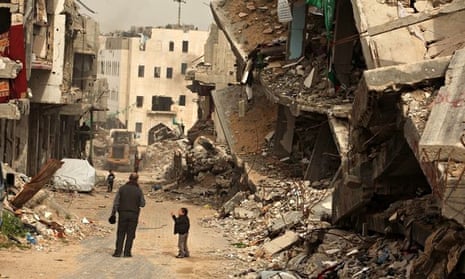Serious questions have been raised by the Israeli human rights group B’Tselem about the legality of Israel’s policy of targeting dozens of Palestinian homes during last summer’s war in Gaza – a strategy that led to hundreds of civilian deaths.
The report is the latest alleging serious breaches of international humanitarian law by Israel during the 50-day conflict. According to B’Tselem, the policy of striking residences led to the deaths of 606 people in 70 attacks on homes that it examined. Among the dead were 93 children under the age of five.
The claims come at a sensitive time for Israel following the announcement this month of an initial investigation by the international criminal court into whether war crimes were committed in Gaza.
Although a number of individual incidents are being investigated by the Israeli military attorney general, the specific policy of targeting residences is not under investigation, despite the high death toll. The issue could potentially be taken up by an ICC investigation.
The prosecution of the war is also being investigated by the UN Human Rights Council, by a commission of inquiry set up by the UN secretary general, Ban Ki-moon, and by the Israeli state comptroller, Joseph Shapira, who has been tasked with investigating decisions made by Israeli political and military leaders.
The B’Tselem research follows hard on the heels of a report by Physicians for Human Rights-Israel this month that strongly criticised the Israeli military’s system for warning Gaza’s citizens of impending strikes during the conflict, also citing the lack of safe evacuation routes and strikes against rescue teams.
In December, Amnesty International said the destruction of four high-rise buildings during the conflict was a war crime “carried out deliberately and with no military justification”.
The latest claims go further than the question of whether or not individual soldiers acted improperly, taking aim instead at Israeli ministers – including the prime minister, Binyamin Netanyahu – who approved the policy of attacking homes.
“This is something we had not seen in previous rounds of violence in Gaza,” said B’Tselem’s executive director Hagai El-Ad. “[Israel] should have been aware this high civilian death toll would be the outcome of this policy. And if not on day one, then certainly by day 12. Yet the policy continued until the end of the violence.”
Although B’Tselem sent a copy of the report to Netanyahu’s office for comment more than a week ago, his office had not responded by the time of publication. However, Israeli officials have criticised previous reports and investigations for focusing on Israeli actions rather than Hamas rocket fire out of Gaza.
The Israeli military rejected the report’s claims in a statement released on Wednesday morning. “The IDF does not attack residential buildings in Gaza – but rather military targets that are often located within residential buildings. The IDF categorically rejects the assertion of a policy of deliberately attacking residential homes solely on the basis that they were residences belonging to members of Hamas or Islamic Jihad.”
It said residential buildings were only attacked “where they became legitimate military targets, or when a person constituting a legitimate military target was in the structure” following an assessment “with regard to the principle of proportionality”.
The wholesale targeting of homes – often of the families of members of Gaza’s militant groups including Hamas and Islamic Jihad – was a departure from the two previous conflicts in Gaza where the tactic was used relatively rarely by the Israeli military.
Although B’Tselem conceded that Hamas and others were responsible for breaches of international law by targeting civilian areas with indiscriminate rocket fire, it said that did not provide either moral or legal justification for a policy that claimed so many civilian lives.
The details in the report – including 13 incidents in which a total of 179 people died – rehearse a litany of horror. In one of the worst incidents, the bombing of the al-Dali building in Khan Younis on 29 July 2014, 34 people were killed including 18 minors.
Under international humanitarian law covering conflict, there is a two-fold test for targeting civilian sites. The first is whether the building is being used for a specific military purpose, for instance storing weapons, or as a position from which attacks are being launched. The second consideration is whether the attack confers “a clear military advantage” that outweighs any civilian deaths.
In a number of cases listed by the report, Israeli military spokesmen justified attacks on houses because of the affiliation of a resident with a militant group and his past history, rather than in terms of activity going on within the house during the conflict.
Although senior IDF commanders and the Israeli military attorney general, Danny Efroni, have argued that homes were used as “operational headquarters” by Hamas, the group says that despite requests no evidence has been provided in the vast majority of cases to justify the strikes.
Separately, the UN Relief and Works Agency announced it had been forced to suspend its cash assistance programme in Gaza for repairs to damaged and destroyed homes and for rental subsidies to the homeless because of a $585m (£385m) shortfall in aid pledged by donors but not delivered.
“We are talking about thousands of families who continue to suffer through this cold winter with inadequate shelter. People are literally sleeping amongst the rubble, children have died of hypothermia,” said the agency’s director in Gaza, Robert Turner. “$5.4bn was pledged at the Cairo conference last October and virtually none of it has reached Gaza. This is distressing and unacceptable.”
